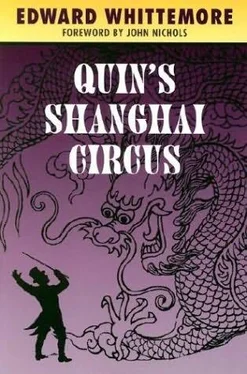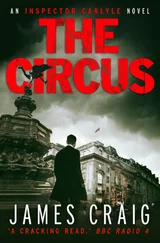Edward Whittemore - Quin’s Shanghai Circus
Здесь есть возможность читать онлайн «Edward Whittemore - Quin’s Shanghai Circus» весь текст электронной книги совершенно бесплатно (целиком полную версию без сокращений). В некоторых случаях можно слушать аудио, скачать через торрент в формате fb2 и присутствует краткое содержание. Жанр: Фэнтези, на английском языке. Описание произведения, (предисловие) а так же отзывы посетителей доступны на портале библиотеки ЛибКат.
- Название:Quin’s Shanghai Circus
- Автор:
- Жанр:
- Год:неизвестен
- ISBN:нет данных
- Рейтинг книги:3 / 5. Голосов: 1
-
Избранное:Добавить в избранное
- Отзывы:
-
Ваша оценка:
- 60
- 1
- 2
- 3
- 4
- 5
Quin’s Shanghai Circus: краткое содержание, описание и аннотация
Предлагаем к чтению аннотацию, описание, краткое содержание или предисловие (зависит от того, что написал сам автор книги «Quin’s Shanghai Circus»). Если вы не нашли необходимую информацию о книге — напишите в комментариях, мы постараемся отыскать её.
Quin’s Shanghai Circus — читать онлайн бесплатно полную книгу (весь текст) целиком
Ниже представлен текст книги, разбитый по страницам. Система сохранения места последней прочитанной страницы, позволяет с удобством читать онлайн бесплатно книгу «Quin’s Shanghai Circus», без необходимости каждый раз заново искать на чём Вы остановились. Поставьте закладку, и сможете в любой момент перейти на страницу, на которой закончили чтение.
Интервал:
Закладка:
Hato stumbled into the living room where the big foreigner was sitting with a blanket wrapped around him, shaking, sweating. A television set hummed on the far side of the room. Hato smiled weakly and tried to think of the crippled girl in New York, his shoeboxes of airplane disasters, the chow mein whore, movies.
Nothing happened. He had forgotten all his English.
He grinned and then he frowned. He was wetting his pants. He saw the big foreigner wave, and in desperation he waved back.
Hurry, whispered the foreigner. The blizzard’s here, we can’t wait any longer, we have to begin the ceremony.
He pulled a small table over and wedged it between his legs. He pushed another small table toward Hato.
Beat the drum, he whispered. Hurry, call the tribe.
Hato squatted on the floor watching the big foreigner with the dark face and the slanting eyes and the high cheekbones drum on the table. He drummed for several minutes and then raised his arms to the sky. There were tears in his eyes as he chanted.
Women hey.
Oysters hey.
Hey hey hey.
I’ve seen it, whispered the big foreigner. I’ve been to the top of the mountain and seen the palace. I’ve looked down into the valley.
While the fool and the giant beat their drums the policeman was working his way around the room. He crouched, he loped, he crept on all fours. He prowled the corners and sniffed the air for the stars he had seen in a Siberian pine grove. He came across a translucent green paperweight stolen from the desk of a customs official in New York.
The paperweight reminded him of urinal candy, urinal candy reminded him of Baron Kikuchi and his father’s eaten face. He bit into the paperweight and snapped his front teeth, the pain bringing with it a jumble of memories.
A huge overcoat.
Frozen rice paddies.
Mulberry trees.
Landlords and taxes.
Peace.
Riots.
Shredded testicles.
War.
Hair.
A special sound.
Latrines.
Mushrooms.
Icy cellars, scalped heads, razors, a blackjack.
His head was humming, he had to have the silence of that other night under the stars. He picked up the heavy television set and brought it down with all his strength.
Glass broke, metal cracked, wires spun. The foreigner’s huge body toppled backward, the box driven down to his shoulders. His eyes were still open but his skull was crushed, his mouth jammed shut. The policeman saw the face in the hole where the screen had been.
Hato was down on his knees, his chin covered with saliva. The policeman kicked him and watched him fall over. He was moaning, twitching, gripped by a seizure he had last experienced as a child on a bed of movie magazines. His hand reached out for the familiar objects, the gloves and hairpieces and empty lipstick tubes, but there was nothing there but the table drum. He bit his lip. Swallowed. Blood frothed over his mouth.
He was strangling on his own tongue.
The policeman undid the cross the foreigner was wearing and tied it around his own neck. He took the piece of meat out of the foreigner’s pocket and squeezed it. White worms dribbled through his fingers. He dropped the meat and licked his fingers.
In the kitchen he found some cans of beer and a package of cigarettes. He smoked and drank until the cans were all empty, then he urinated in one of them and put it back in the refrigerator. He shredded the cigarettes that were left and scattered the tobacco around the kitchen.
Hato was no longer twitching. The policeman dropped his trousers to make a pile between the two boys and smell the familiar smell.
At the subway station he bought a newspaper and stood patiently in line waiting to buy his ticket. All the other passengers in the subway were using their newspapers to fan themselves, but he held his in front of him pretending to read. From Tsukiji he walked to Tokyo Bay, to the end of the concrete breakwater where Quin had recently been with Baron Kikuchi’s former chauffeur.
Steps led down to the water. The lights of the city hid most of the stairs. The water was very black as he approached the giant steps of the Tohoku and descended them for the last time.
Around his neck hung the small gold cross that had been revered for thirteen centuries by traders crossing central Asia, a cross that had once been given to Adzhar by his wife and subsequently worn by Maeve and the General and Mama before a naked giant stole it in Shanghai, stole it for safekeeping, and kept it for thirty years until he could return it to the doomed son of the Shanghai circus, a lonely Mongol horseman from whom it might have been taken in order to bring to an end the last invisible caravans hidden in the code name Gobi , carried at last to a dark resting place in the waters where its glittering lines could no longer cross and recross the lives of those who had worn it over the years in honor of love and the memory of love.
Himself, Herself
Move. March.
Where?
What does it matter? All good roads are within. Mine has been a long one and perhaps your march must be long as well.
—Adzhar to a leader of the 1927 Communist uprising in Shanghai
One September morning shortly before dawn a procession of black limousines was seen approaching Tokyo from some point to the south, perhaps Kamakura, where they had apparently gathered during the hours of darkness. The limousines entered the city and moved slowly down a main thoroughfare keeping themselves bumper to bumper, all of them empty save for a driver.
The funeral procession crept around the streets in a wide curve until by mid-morning the entire center of the city was blocked off in a gigantic circle of mourning. By then the first limousine had come up behind the last to form an unbroken chain, making it impossible to estimate how many thousands of vehicles there might be in the solemn parade.
Since neither traffic nor pedestrians could pass through the mysterious black ring, the stores and offices of Tokyo eventually closed and the government declared an unofficial holiday. Twelve million people came out to watch the unannounced and nameless event while around the world many millions more pondered the total inscrutability of the Orient, bewildered that the death of one unknown person could cause a funeral of such magnitude. In fact it was the most magnificent funeral celebrated in Asia since the death of Kublai Khan, but only one man understood this completely, that other wanderer from the thirteenth century who called himself Father Lamereaux.
From the lawn of an elegant inn, amid stone lanterns and stone paths, twisted pines and miniature bridges, the two surviving half-brothers watched the procession. Kikuchi-Lotmann knew now that the woman he had described on the highbar in the abandoned warehouse was indeed his mother, but that his father had not been the circus master of that story but of another, one that began on a houseboat in Shanghai when his father and Quin’s father had been introduced to each other by the woman they both loved eight years before their deaths, eight years before the circus and Nanking, eight years before the conception of the third half-brother, whose funeral was now being celebrated in the world’s largest city, the cause of the black ring around Tokyo twenty years after the end of the war known only to them and the Kannon Buddha and the aging Emperor who had long ago found homes for the sons of Maeve and Mama.
Quin nodded to himself, Kikuchi-Lotmann changed his necktie. They watched the procession until sunset, when a servant appeared with a picnic basket and spread a tablecloth on the grass with lox and winter sable, white-fish, pickled herring and herring in cream, rollmops, pickled tomatoes, cream cheese and chives, olives, chopped liver, a tray of bagels.
Читать дальшеИнтервал:
Закладка:
Похожие книги на «Quin’s Shanghai Circus»
Представляем Вашему вниманию похожие книги на «Quin’s Shanghai Circus» списком для выбора. Мы отобрали схожую по названию и смыслу литературу в надежде предоставить читателям больше вариантов отыскать новые, интересные, ещё непрочитанные произведения.
Обсуждение, отзывы о книге «Quin’s Shanghai Circus» и просто собственные мнения читателей. Оставьте ваши комментарии, напишите, что Вы думаете о произведении, его смысле или главных героях. Укажите что конкретно понравилось, а что нет, и почему Вы так считаете.












